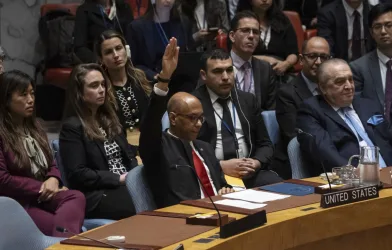
Attorneys representing a Kansas man convicted of a 2016 plot to massacre Somali Muslim refugees by bombing a mosque and apartment complex in Garden City, Kan., have asked a federal judge to consider a more lenient sentence, arguing that President Trump’s inflammatory rhetoric should be taken into account as the “backdrop” for the case.
Patrick Eugene Stein faces life in prison for conspiring with two other men to carry out the attack, which was supposed to take place on the day after the 2016 presidential election. On Monday, his attorneys filed a memo in U.S. District Court in the District of Kansas, requesting that Stein receive a sentence of no more than 15 years. They note that Stein was an “early and avid supporter” of Trump and argue that the climate in the months leading up to the 2016 election should be taken in account when evaluating the comments prosecutors used to build their case.
During the trial in the spring, prosecutors played back recordings in which Stein described Muslim immigrants as “cockroaches” that needed to be exterminated, and talked about killing Muslims with weapons dipped in pigs’ blood. Two months before the conversation took place, The Washington Post’s Abigail Hauslohner noted, Trump had referenced a questionable tale about Gen. John J. Pershing killing Muslims with bullets dipped in pigs’ blood.
“The court cannot ignore the circumstances of one of the most rhetorically mold-breaking, violent, awful, hateful and contentious presidential elections in modern history, driven in large measure by the rhetorical China shop bull who is now our president,” James Pratt and Michael Shultz, Stein’s defense attorneys, wrote in their sentencing memo, as HuffPost first reported.
Someone “normally at a 3 on a scale of political talk might have found themselves at a 7 during the election,” they argue. “A person, like Patrick, who would often be at a 7 during a normal day, might ‘go to 11.’”
Stein was arrested by the FBI in October 2016, along with Curtis Allen and Gavin Wright. In April, the three men, who had called themselves “the Crusaders,” were found guilty of conspiring to use a weapon of mass destruction and conspiring to violate the civil housing rights of others. All three are scheduled to be sentenced Friday.
Before the trial began, attorneys for the three men asked that the jury include people from areas of Kansas that overwhelmingly supported Trump. Their request was denied.
[‘It will be a bloodbath’: Inside the Kansas militia plot to ignite a religious war]
In the sentencing memo, Stein’s attorneys wrote that their client feared Muslims “because of what he learned about them on the internet and the videos he watched on YouTube.” His knowledge of the Koran, they say, “came directly from the internet and conservative talk-show hosts such as Sean Hannity and Michael Savage.”
Stein struggled with alcohol and meth addictions throughout his life, which contributed to the failure of two marriages and estrangement from his sons, his attorneys stated. He had wanted to open up a biofuels plant in rural Kansas, they wrote, but the plan had failed when the economy crashed in 2008, leaving Stein “unmoored and struggling.”
Framing Stein as the prototypical “lost and ignored” white working-class voter who helped elect Trump, Stein’s attorneys wrote that “almost no one” had thought Trump would win the 2016 election.
“Trump’s win changed everything, and it is reasonable to speculate that it would have changed things among the defendants as well,” they wrote. “The urgency for action would be gone. The feeling of a losing battle would be gone.”
They concluded, “It is logical to conclude that the discussed attack would never have happened in the world that existed post-Trump.”
Others might disagree. Trump has faced accusations that his rhetoric is directly responsible for the recent spate of political violence, from the mass shooting at a Pittsburgh synagogue to the mail bombs received by some of the president’s most prominent critics. He and his allies in the GOP have pushed back on these claims: Implying that political bias was at work, Trump told Fox News’s Laura Ingraham on Monday that Sen. Bernie Sanders (I-Vt.) hadn’t been blamed when a supporter shot Rep. Steve Scalise (R-La.) and that President Barack Obama hadn’t been blamed for the 2015 mass shooting at a black church in Charleston, S.C.
Meanwhile, Trump’s words have found their way into otherwise unrelated court cases. Last week, a man accused of groping another passenger on a Southwest Airlines flight reportedly told authorities that “the President of the United States says it’s okay to grab women by their private parts.” Trump’s remarks that it should be illegal to use the testimony of “flippers” — people who cooperate with prosecutors in exchange for avoiding jail time — were cited earlier this month by Joseph “Skinny Joey” Merlino, a Philadelphia mob boss, after he was sentenced to two years in federal prison. And Trump’s own federal prosecutors have sought to have his comments about “flippers” barred from being used during the trial of Joaquin “El Chapo” Guzman, suggesting they might influence a jury.
Source: The Washington Post
Man Convicted of Planning to Massacre Somalis Was Influenced by Trump, His Lawyers Say
Published: October 31, 2018







